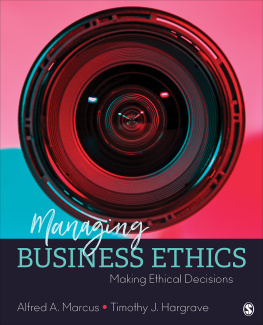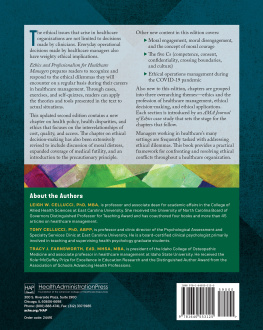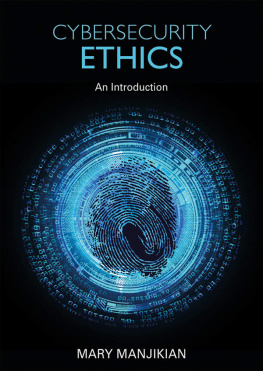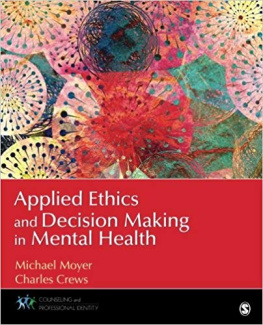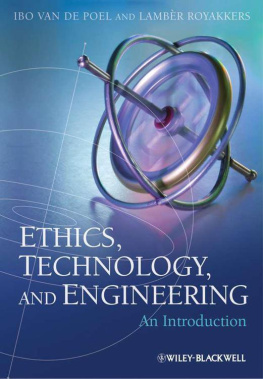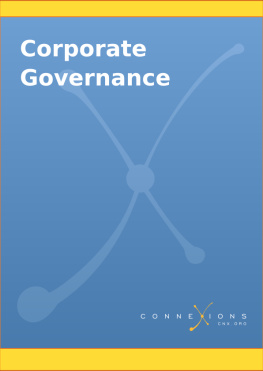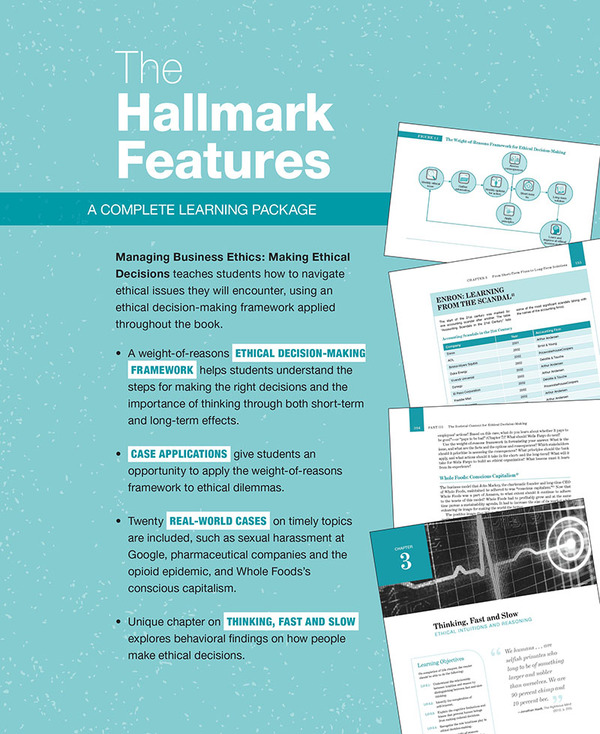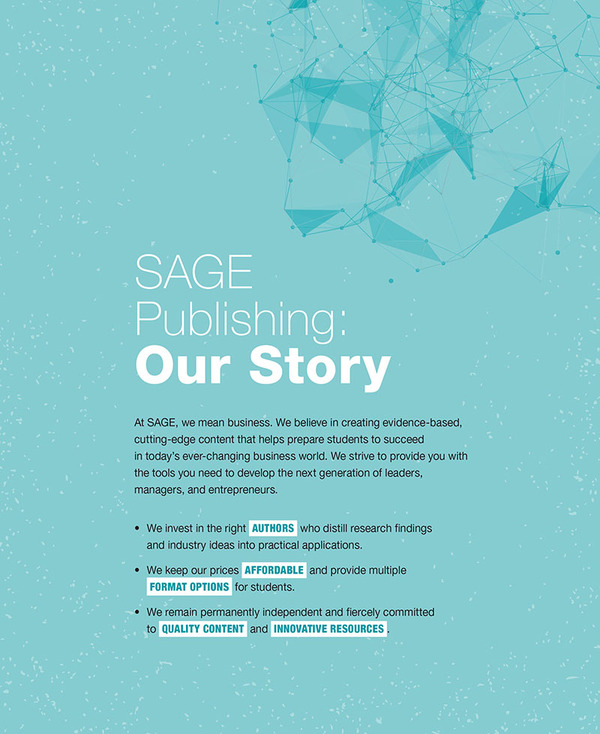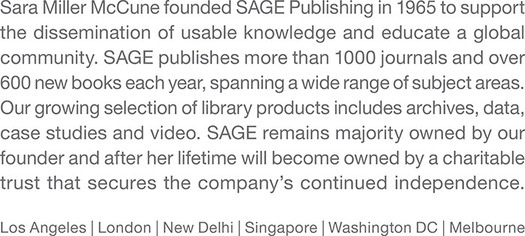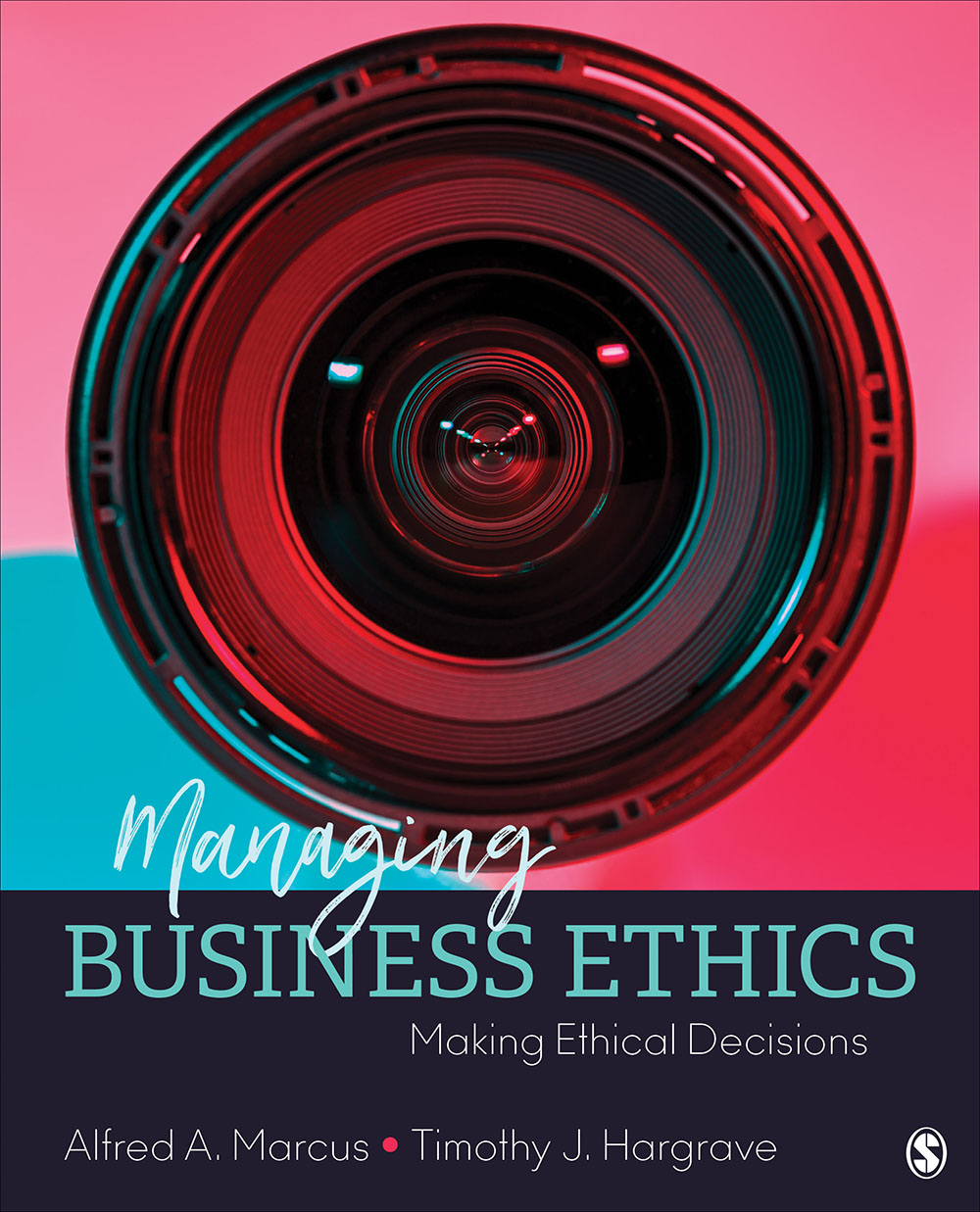
The Hallmark Features
A complete learning package
Managing Business Ethics: Making Ethical Decisions teaches students how to navigate ethical issues they will encounter, using an ethical decision-making framework applied throughout the book.
A weight-of-reasons ETHICAL DECISION-MAKING FRAMEWORK helps students understand the steps for making the right decisions and the importance of thinking through both short-term and long-term effects.
CASE APPLICATIONS give students an opportunity to apply the weight-of-reasons framework to ethical dilemmas.
Twenty REAL-WORLD CASES on timely topics are included, such as sexual harassment at Google, pharmaceutical companies and the opioid epidemic, and Whole Foodss conscious capitalism.
Unique chapter on THINKING, FAST AND SLOW explores behavioral fi ndings on how people make ethical decisions.
SAGE Publishing: Our Story
At SAGE, we mean business. We believe in creating evidence-based, cutting-edge content that helps prepare students to succeed in todays ever-changing business world. We strive to provide you with the tools you need to develop the next generation of leaders,
managers, and entrepreneurs.
We invest in the right AUTHORS who distill research findings and industry ideas into practical applications.
We keep our prices AFFORDABLE and provide multiple FORMAT OPTIONS for students.
We remain permanently independent and fiercely committed to QUALITY CONTENT and INNOVATIVE RESOURCES .
Managing Business Ethics
To my family, my amazing wife, Judy, my son, David, and his wife, Laura, both editors of note, my other son, Ariel, who brings us fantastic music from Spotify, his employer, and to all the wonderful students at the Carlson School like Tim Hargrave, with whom I have had the opportunity to interact.
Alfred A. Marcus
I dedicate this book first and foremost to my family, who give meaning, sorrow, and joy to my life. And to all the ethical and unethical people I have come across. They have made the lessons of this book real to me.
Timothy J. Hargrave
Managing Business Ethics
Making Ethical Decisions
- Alfred A. Marcus
- University of Minnesota
- Timothy J. Hargrave
- Central Washington University

- Los Angeles
- London
- New Delhi
- Singapore
- Washington DC
- Melbourne
FOR INFORMATION:
SAGE Publications, Inc.
2455 Teller Road
Thousand Oaks, California 91320
E-mail: order@sagepub.com
SAGE Publications Ltd.
1 Olivers Yard
55 City Road
London EC1Y 1SP
United Kingdom
SAGE Publications India Pvt. Ltd.
B 1/I 1 Mohan Cooperative Industrial Area
Mathura Road, New Delhi 110 044
India
SAGE Publications Asia-Pacific Pte. Ltd.
18 Cross Street #10-10/11/12
China Square Central
Singapore 048423
Copyright 2021 by SAGE Publications, Inc.
All rights reserved. Except as permitted by U.S. copyright law, no part of this work may be reproduced or distributed in any form or by any means, or stored in a database or retrieval system, without permission in writing from the publisher.
All third-party trademarks referenced or depicted herein are included solely for the purpose of illustration and are the property of their respective owners. Reference to these trademarks in no way indicates any relationship with, or endorsement by, the trademark owner.
Printed in the United States of America
Library of Congress Cataloging-in-Publication Data
Names: Marcus, Alfred A. (Alfred Allen), 1950- author. | Hargrave, Timothy J., author.
Title: Managing Business Ethics: Making Ethical Decisions / Alfred A. Marcus, University of Minnesota, Timothy J. Hargrave, Central Washington University.
Description: Los Angeles: SAGE [2021] | Includes bibliographical references and index.
Identifiers: LCCN 2019034547 | ISBN 978-1-5063-8859-5 (paperback) | ISBN 978-1-5063-8857-1 (epub) | ISBN 978-1-5063-8858-8 (epub) | ISBN 978-1-5063-8860-1 (pdf) | ISBN 978-1-5063-8861-8 (pdf)
Subjects: LCSH: Business ethics.
Classification: LCC HF5387 .M3455 2021 | DDC 174/.4dc23
LC record available at https://lccn.loc.gov/2019034547
This book is printed on acid-free paper.
Acquisitions Editor: Maggie Stanley
Editorial Assistant: Janeane Calderon
Content Development Editor: Darcy Scelsi
Production Editor: Rebecca Lee
Copy Editor: QuADS Prepress (P) Ltd.
Typesetter: C&M Digitals (P) Ltd.
Proofreader: Sally Jaskold
Indexer: Sheila Hill
Cover Designer: Gail Buschman
Marketing Manager: Sarah Panella
Brief Contents
Preface
Are business school ethics courses and the textbooks they use effective? Do they help prepare business school students to make tough ethical decisions? While most business schools today have a commitment to ethics across all levels of the curriculum, many commentators have their doubts about business ethics courses. Business schools have been assigned some of the blame for the wave of ethics scandals that took place in the early 2000s, the dubious activities of financial firms that contributed to the Great Recession several years later, and more recent instances of corporate wrongdoing, many of which are documented in this book.
While it has not been our experience that business schools are guilty of teaching a profit-first and perhaps even amoral and avaricious win at all costs mentality, as they have been accused of doing, we do believe that business schools as a whole are not adequately preparing students to address the complex ethical challenges they face. Too many business ethics courses and the textbooks they use tend to focus on moral philosophy; they acquaint students with philosophical frameworks for thinking about ethics and present them with ethical dilemmas similar to those they can expect to encounter in the business world. Unfortunately, though, they tend to fall short when it comes to preparing students to deeply understand and creatively respond to these dilemmas. For one, they underestimate or disregard impediments to ethical decision-making such as our mental limitations and biases, and the impact of social influences on our decisions. They tend not to account for the human predilection to obey our bosses, conform with group norms, and make fast, intuitive decisions rather than carefully apply rational decision-making frameworks. Just as they overlook the impediments to good decision-making, so too they do not give enough attention to the tools that help decision-makers to overcome these impediments. Jonathan Haidt, business ethics chair at New York Universitys Stern School, summarizes the current situation when he writes,

